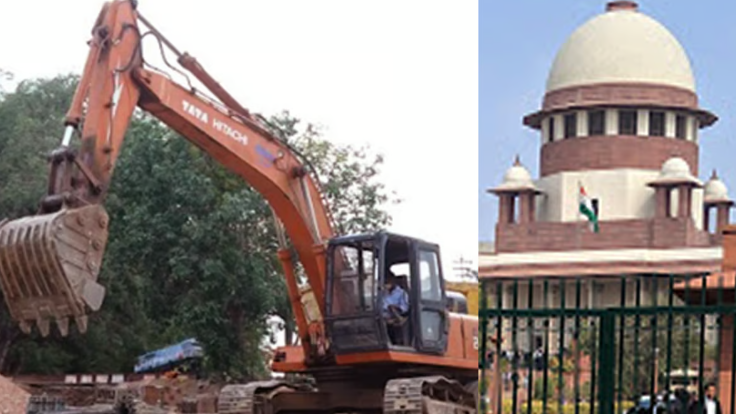Supreme Court’s Condemnation of “Bulldozer Justice” (GS Paper 2, Governance)

Context
- The Supreme Court of India has recently taken a strong stance against the practice commonly referred to as “bulldozer justice,” where authorities use heavy machinery to demolish the properties of individuals accused of crimes.
- This practice has been observed in several states across India, including Uttar Pradesh, Delhi, Madhya Pradesh, Gujarat, Assam, and Maharashtra.
What is ‘Bulldozer Justice’?
‘Bulldozer justice’ involves demolishing the homes, shops, or establishments of individuals who are accused of criminal activities, particularly those involved in communal riots or other offenses. This form of justice is characterized by:
- Use of Bulldozers: Heavy machinery is used to flatten properties without legal proceedings.
- Targeted Demolitions: Properties of alleged criminals or those accused of communal violence are targeted.
- Lack of Due Process: Demolitions often occur without following established legal procedures or granting the accused a fair chance to contest the action.
Supreme Court Ruling
The Supreme Court has disapproved of bulldozer justice, emphasizing that:
- Property Rights: No property should be demolished merely due to an individual's involvement in criminal activities. Legal procedures must be followed, regardless of the individual’s status as a convict.
- Due Process: The Court highlighted the necessity of adhering to legal protocols and natural justice principles before any demolition is executed.
- Need for Guidelines: The Court called for the development of nationwide guidelines to regulate such actions, ensuring that due process is maintained.
Issues with Bulldozer Justice
Targeting Marginalized Communities:
- Disproportionate Impact: Marginalized and minority communities often bear the brunt of these demolitions, exacerbating social inequalities and divisions.
Undermining the Rule of Law:
- Bypassing Legal Processes: Bulldozer justice undermines established legal processes and the rule of law, leading to erosion of public trust in institutions.
Violation of Human Rights:
- Right to Shelter: Demolitions without proper legal proceedings violate fundamental human rights, including the right to shelter and protection against arbitrary state action.
- Lack of Compensation: The absence of resettlement or compensation for those affected raises serious ethical concerns.
Ethical Issues:
- Conflation of Roles: Bulldozer justice merges the roles of judge, jury, and executioner, leading to potential injustices where innocent family members may suffer due to the actions of a relative.
Psychological Trauma:
- Community Impact: The abrupt and often violent nature of demolitions can inflict significant psychological trauma on affected individuals and their communities.
Way Ahead
- Bulldozer justice fosters a culture of fear and retribution rather than adhering to principles of fair trial and justice.
- This approach conflicts with the foundational ethos of a democratic society, which values justice, proportional punishment, and due process.
- In a democratic setting, justice should focus on rehabilitation and reform rather than mere retribution.
What is Retributive Justice?
- Definition: Retributive justice emphasizes punishment as a response to wrongdoing, proposing that offenders should be punished proportionally to the severity of their crimes.
- Principle: The punishment should reflect a balance between the harm caused by the offender and the suffering imposed as a consequence.
Challenges with Retributive Justice:
- Backward-Looking: Retributive justice focuses on addressing past wrongs rather than future outcomes, such as deterrence or rehabilitation.
- Harsh Punishments: When not implemented carefully, retributive justice can result in excessively harsh punishments, particularly if proportionality is not well-defined or enforced.
Conclusion
- The Supreme Court’s disapproval of bulldozer justice underscores the need for adherence to legal and ethical standards in administering justice.
- Ensuring that demolitions and punitive actions follow due process and respect human rights is crucial for maintaining trust in legal institutions and upholding democratic values.
- As India navigates these challenges, it is imperative to balance retributive justice with principles of fairness, proportionality, and rehabilitation.


